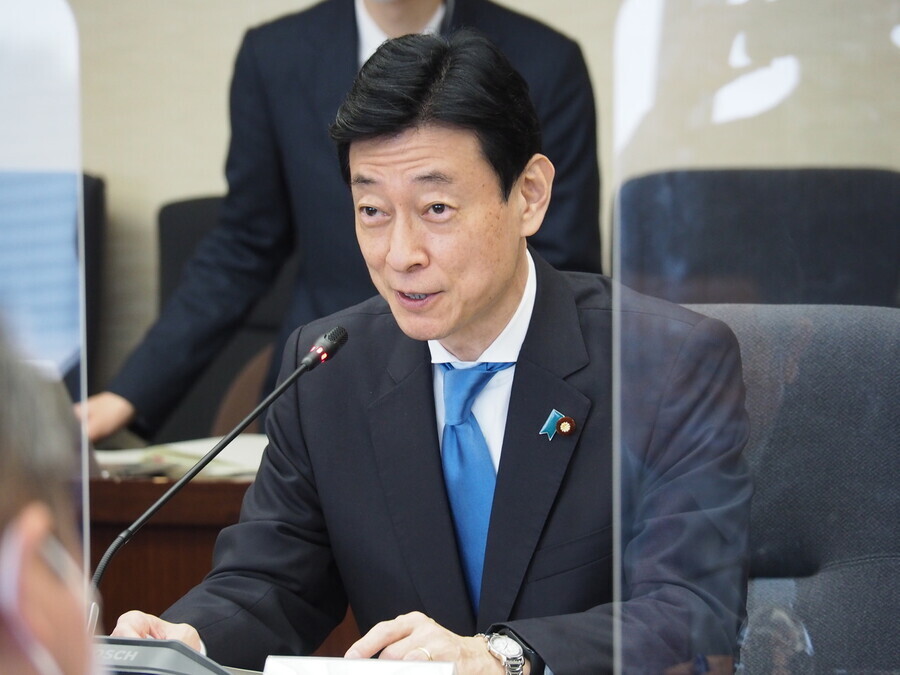hankyoreh
Links to other country sites 다른 나라 사이트 링크
Japan says Korean team won’t verify safety of Fukushima wastewater, rebutting Seoul’s claim

The Japanese minister in charge of the release of contaminated water from the Fukushima Daiichi nuclear power plant said that the South Korean inspection team traveling to Japan on May 23-24 will not be visiting to “evaluate or certify the safety of” the contaminated water.
This statement shows that the visit will be a “tour” of the site rather than a “joint inspection,” as South Korea’s presidential office has claimed.
However, the presidential office has stood by its stance, stating that “there is a principle of investigation of the operation and management of Japan’s contaminated water purification facilities.”
At a press conference after a Cabinet meeting on Tuesday, Minister of Economy, Trade and Industry Yasutoshi Nishimura stated that the visit of the South Korean inspection team was to “help deepen understanding in South Korea about the safety of the release,” and “not to evaluate or certify the safety of the treated water.”
He also reiterated that the International Atomic Energy Agency (IAEA) is carrying out a verification of the water release. Nishimura stated that the inspection is being coordinated by both South Korea and Japan “on the premise of the IAEA’s review,” and stated, “Based on the IAEA’s comprehensive report to be released by June, we will increase transparency over the issue and continue to communicate with the international community to seek support over the water release.”
With this, Japan has clearly drawn a line to show that the safety of the contaminated water is not within the jurisdiction of South Korean inspectors to intervene.
Nishimura also noted that the South Korean team’s visit to Fukushima is not unique.
“We have received similar visits from other countries,” the minister said, adding that the South Korean investigation team will be informed of “the status of the treated water tanks, the progress of construction, and the method in which the water will be released.”
As he stated, teams from both Taiwan (March and November 2022) and Pacific Island nations (February 2023) have previously made on-site visits.
Foreign Minister Yoshimasa Hayashi also mentioned in a regular press conference on Tuesday that Japan had “agreed to the visit of the South Korean inspection team this month.”
“We look forward to deepening South Korea’s understanding of the situation,” the foreign minister said.
In response, a South Korean presidential office official stated it would send “the best experts in their field to ensure there are no points of concern by the public.”
“The basic plan is to investigate whether Japan’s contaminated water purification facilities are operating reliably and have sufficient operational capacity,” the office stated. “However, consultations with Japan are still underway.”
An official with South Korea’s Foreign Ministry also stated, “We will consult with relevant parties to obtain as much information as possible.” The ministry is considering extending the visit beyond the initial plan of two days to ensure enough time for a thorough investigation.
Previously, upon President Yoon Suk-yeol of Korea and Prime Minister Fumio Kishida of Japan agreeing on Sunday to send a Korean team to the Fukushima nuclear plant, where the wastewater is being stored, a senior Yoon administration official expressed expectations that it would be “possible to investigate the substances and elements [in the contaminated water] together.”
Starting this summer, the Japanese government will begin releasing 1.32 million metric tons of wastewater from the Fukushima nuclear power plant into the ocean after diluting the concentration of radioactivity to below legal standards. It plans to release the water into the sea over the course of 30 years.
The concentration of tritium, a radionuclide that cannot be removed with Japan’s Advanced Liquid Processing System, will be diluted to less than one-fortieth of the standard before being released into the ocean.
By Kim So-youn, Tokyo correspondent; Kim Mi-na, staff reporter; Jang Ye-ji, staff reporter
Please direct questions or comments to [english@hani.co.kr]

Editorial・opinion
![[Column] Season 2 of special prosecutor probe may be coming to Korea soon [Column] Season 2 of special prosecutor probe may be coming to Korea soon](https://flexible.img.hani.co.kr/flexible/normal/500/300/imgdb/original/2024/0426/3317141030699447.jpg) [Column] Season 2 of special prosecutor probe may be coming to Korea soon
[Column] Season 2 of special prosecutor probe may be coming to Korea soon![[Column] Park Geun-hye déjà vu in Yoon Suk-yeol [Column] Park Geun-hye déjà vu in Yoon Suk-yeol](https://flexible.img.hani.co.kr/flexible/normal/500/300/imgdb/original/2024/0424/651713945113788.jpg) [Column] Park Geun-hye déjà vu in Yoon Suk-yeol
[Column] Park Geun-hye déjà vu in Yoon Suk-yeol- [Editorial] New weight of N. Korea’s nuclear threats makes dialogue all the more urgent
- [Guest essay] The real reason Korea’s new right wants to dub Rhee a founding father
- [Column] ‘Choson’: Is it time we start referring to N. Korea in its own terms?
- [Editorial] Japan’s rewriting of history with Korea has gone too far
- [Column] The president’s questionable capacity for dialogue
- [Column] Are chaebol firms just pizza pies for families to divvy up as they please?
- [Column] Has Korea, too, crossed the Rubicon on China?
- [Correspondent’s column] In Japan’s alliance with US, echoes of its past alliances with UK
Most viewed articles
- 1Is Japan about to snatch control of Line messenger from Korea’s Naver?
- 2Up-and-coming Indonesian group StarBe spills what it learned during K-pop training in Seoul
- 3‘We must say no’: Seoul defense chief on Korean, USFK involvement in hypothetical Taiwan crisis
- 4[News analysis] Using lure of fame, K-entertainment agency bigwigs sexually prey on young trainees
- 5[Column] Park Geun-hye déjà vu in Yoon Suk-yeol
- 6Is N. Korea threatening to test nukes in response to possible new US-led sanctions body?
- 7Korea’s 1.3% growth in Q1 signals ‘textbook’ return to growth, says government
- 8Division commander ordered troops to enter raging flood waters before Marine died, survivor says
- 9Report reveals toxic pollution at numerous USFK bases
- 10[Editorial] Statue should not be central concern of comfort women issue